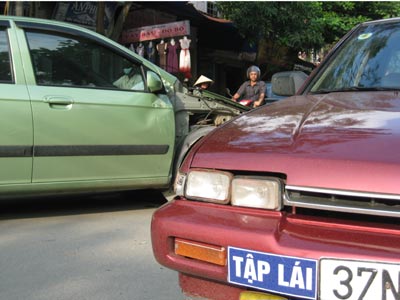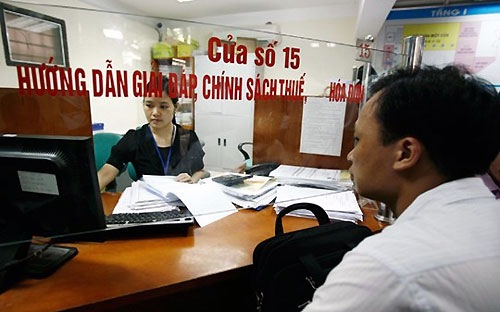The Law on Procurement is an important legal basis that gradually brings procurement activities using state funds into order. The Law on Procurement of 2005 and the Law on amendments and supplements to certain provisions of laws related to basic construction investment of 2009, along with a system of documented guidance for the implementation of these two Laws, have contributed to creating a transparent and competitive environment for procurement activities in line with international practices. This provides a foundation for investors to select contractors with sufficient capabilities and experience in providing goods, services, and works, thereby helping to save the limited state funds. However, during the implementation process, the Law on Procurement of 2005 has also revealed obstacles and limitations regarding the scope of regulation, decentralization in procurement activities, and approval procedures.

In procurement activities using state capital, there are acts of circumventing the law or non-compliance with the full regulations of procurement law. However, the penalties for violations are not strong enough and not comprehensive for all parties involved in procurement activities; the professionalism and proficiency in procurement activities are not uniform and still limited in some localities; the quality and efficiency of some preparations for procurement are not high; post-procurement management is not regularly and properly carried out; there are cases of collusion, unreasonable appointment, prolonged execution time of packages, causing waste and loss of state capital. Therefore, it is necessary to amend to overcome the shortcomings of the 2005 Procurement Law.
Based on the above reality, the 2013 Procurement Law was passed by the National Assembly, XIII Legislature, at its 6th session on November 26, 2013, consisting of 13 chapters with 96 articles, and was built on the basis of a comprehensive amendment of the 2005 Procurement Law, Article 2 of the Law amending and supplementing several articles of laws related to basic construction investment in 2009. From July 1, 2014, when Procurement Law No. 43/2013/QH13 becomes effective, Procurement Law No. 61/2005/QH11 will no longer be in effect; and Section 1, Chapter VI of Construction Law No. 16/2003/QH11 and Article 2 of the Law amending and supplementing several articles of laws related to basic construction investment No. 38/2009/QH12 will be nullified.
The 2013 Procurement Law was built from the urgent demands during the process of building and perfecting, unifying the legal system on procurement using state capital, eliminating overlapping and conflicts among legal documents in the procurement field. Compared with the 2005 Procurement Law, the 2013 Procurement Law has the following fundamental new points:
First, regarding the scope of regulation, besides investment projects of state agencies and state enterprises, the Law also regulates additional private partnership projects using 30% or more state capital, or less than 30% state capital but with a project scale exceeding 500 billion VND, also falls under the Law's scope.
With such regulations, although the workload related to budget capital management that managing agencies must monitor will increase, the management and use of state resources will be more tightly controlled, avoiding cases of wasteful state spending. Furthermore, even private enterprises that do not use any budget capital must comply with the law.
Second, the 2013 Procurement Law has clearly stipulated preferential policies specifically for domestic contractors and domestically produced goods when participating in domestic or international bidding.
For domestic contractors, the Law creates opportunities for domestic contractors to win bids and focuses on prioritizing local human resource development. The 2013 Procurement Law requires foreign contractors participating in international bidding in Vietnam to form a joint venture with domestic contractors. In the case of a joint venture where the part taken on by the domestic contractor accounts for 25% or more of the value of the work package, preferences will be applied. Additionally, contractors employing women, veterans, disabled persons, or small businesses will enjoy preferential policies when participating in domestic bidding.
For domestic goods, the Law favors services and products made domestically, in response to the policy of the Politburo to "Encourage Vietnamese people to prioritize using Vietnamese goods," create jobs for local workers, and contractors will have preferences when participating in domestic or international bidding to supply goods with local production costs accounting for 25% or more.
These regulations are carefully calculated, not contrary to international practices, and any country also has policies to support and promote domestic production and create jobs for underprivileged workers in society. At the same time, with this regulation, it will gradually help Vietnamese contractors receive advanced technology and management experience, self-reliance, improve their capacity, competitiveness, to eventually become independent contractors carrying out large, high-tech, complex packages not only in the Vietnamese market but also in the international market.
Third, in reality, what businesses desire most is for all procedures and processes to be open, transparent, and centralized at one focal point for clear, specific guidance. They also hope that in the immediate future, it will support and prioritize domestic contractors to overcome initial difficulties. Therefore, the 2013 Procurement Law amended some existing regulations to simplify administrative procedures in procurement activities according to Resolution No. 25/NQ-CP dated June 2, 2010, of the Government of Vietnam on simplifying 258 administrative procedures under the management of Ministries and agencies, and Resolution No. 70/NQ-CP dated December 27, 2010, of the Government of Vietnam on simplifying administrative procedures within the management scope of the Ministry of Planning and Investment, and specifying more clearly the processes of selecting contractors for specific cases.
Fourth, the evaluation of bids according to the lowest evaluated price method stipulated in the 2005 Procurement Law, although an advanced method conforming to international practices, does not consider Vietnam's specific conditions and is therefore challenging to apply in some cases. The 2013 Procurement Law has addressed this limitation by adding new evaluation methods to increase flexibility for investors in selecting contractors more suitable to the type and scale of the package, while also addressing the issue of low bids that lack sufficient capability and experience to execute the package. Specifically, when evaluating bids for non-consulting service, goods procurement, construction, and mixed packages, the investor can choose one of the methods, such as: Lowest Bid Price Method, Evaluated Price Method, Combination of Technical and Price Method. For consulting service packages, the investor can choose one of the methods, such as: Lowest Bid Price Method, Fixed Price Method, Based on Technical Method, or Combination of Technical and Price Method.
Fifth, the Law stipulates a centralized procurement method to be widely applied in procurement activities. Under this method, instead of organizing procurement at hundreds of different agencies, a centralized procurement agency will be responsible for organizing professional procurement once. This method not only facilitates increased professionalism in procurement activities but also helps improve efficiency, shorten time, and reduce procurement costs. It also supports domestic production development and encourages contractors to enhance the quality of goods and services.
Along with centralized procurement, the 2013 Procurement Law also adds several main principles and general procedures for routine procurement to strengthen the legal validity of this regulation, ensuring regulatory consistency in the procurement legal system (before the 2013 Procurement Law, this issue was only regulated in circulars). Additionally, the decentralization in routine procurement and bidding is more clearly specified, increasing accountability and simplifying administrative procedures.
Sixth, medicine, and medical supplies are special types of goods that directly affect public health and life, therefore, the 2013 Procurement Law has a dedicated section for the procurement of medicines and medical supplies using state funds, health insurance funds, revenues from medical examination and treatment services, and other legitimate revenues from public health facilities. Because of their specific nature, the investor can also apply the price negotiation form. This is an entirely new form that has emerged in recent years. Therefore, the 2013 Procurement Law promptly added this form to facilitate investors in procuring medicines in cases where the package has only one or two manufacturers, or it involves patented original medicines, rare drugs, or drugs still under patent.
Seventh, the 2013 Procurement Law adds forms and methods for selecting contractors. The Law supplements principle regulations on procedures and methods for selecting investors based on aggregating good international practices and experiences from selecting private investors in and outside Vietnam for implementing infrastructure and public service projects in recent years. This regulation aims to promote public investment restructuring, create a solid legal basis for transparently and competitively attracting and selecting investors, and build investors' confidence in the investment environment in Vietnam.
Regarding forms of selecting contractors: In addition to the forms of selecting contractors already stipulated in the 2005 Procurement Law (open bidding, limited bidding, direct procurement, competitive quotation, direct procurement, self-implementation, selecting contractors, investors in special cases), the 2013 Procurement Law adds the form of community participation to accommodate reality, to promote domestic production development and create jobs for local workers. Packages within national target programs, poverty reduction support programs for mountainous, remote, island areas, socially-economically disadvantaged regions, or small-scale packages can be assigned to local community organizations, groups of workers to perform either whole or partially.
Regarding methods of selecting contractors: The 2005 Procurement Law only stipulates three bidding methods, namely: single-envelope, dual-envelope, and two-stage methods. To facilitate the process of selecting contractors, the 2013 Procurement Law more clearly specifies four bidding methods: single-stage single-envelope; single-stage dual-envelope; two-stage single-envelope; two-stage dual-envelope. Especially, the single-stage dual-envelope method is applied for wide and limited bidding for service, non-consulting service, goods procurement, construction, mixed packages; wide bidding for investor selection (while the 2005 Procurement Law stipulates this method only for consulting service packages).
Eighth, to enhance the responsibilities of contractors and investors during contract performance, and to avoid inappropriate contract type application, contract adjustments, arbitrary contract type adjustments, unreasonable contract duration adjustments, causing wastage, and reducing the investment efficiency of projects in recent times, the 2013 Procurement Law has made a very strong shift in the regulations on contract signing, performance, and management in bidding. This is one of the essential new contents of the 2013 Procurement Law.
For packages within the scope of regulation, the contract type must be clearly specified in the contractor selection plan and only include four types of contracts: Lump-sum contract, fixed unit price contract, adjustable unit price contract, and time-based contract. Among them, the lump-sum contract is identified as the basic contract type, if not applied, one of the other contract types must be proved more suitable. For small-scale and simple packages, the lump-sum contract type is mandatory.
Ninth, the 2013 Procurement Law thoroughly decentralizes procurement. Investment decision-makers, and investors continue to be responsible for the entire process of organizing and implementing packages. Different from the 2005 Procurement Law, the 2013 Procurement Law thoroughly decentralizes the decision-making process for direct procurement to Ministers, Heads of Ministry-level agencies, agencies under the Government of Vietnam, and Chairpersons of People's Committees at all levels without requiring the Prime Minister of the Government of Vietnam's approval. To link decentralization with responsibility, avoiding closeness in bidding, the 2013 Procurement Law adds regulations on the accountability of authorized persons, investors during contractor/bidder selection and implementation.
Tenth, the 2013 Procurement Law is considered a step forward in enhancing supervision. The Law adds requirements for community supervision during contractor selection and contract execution, and adds responsibilities for supervision by authorized persons and state management agencies on procurement.
Additionally, to strengthen sanctions for violations in procurement, the 2013 Procurement Law adds prohibited acts in procurement and specifies additional penalties for individuals assigned with the responsibility to sanction but not complying, supplementary penalties such as publicly disclosing offending entities or individuals in the media, requiring compliance with legal regulations on procurement or compensating damages as stipulated.
With clearly defined, coherent, and stringent contents, the 2013 Procurement Law is expected to significantly improve State management in procurement activities, contributing to enhancing the efficiency of using state funds in the coming period. However, to achieve the objectives set out in the Law, it requires unified direction from the highest levels and the consensus and unity of the ministries, central authorities, and local authorities.
Source: Ministry of Justice
 Article table of contents
Article table of contents





.Medium.png)
.Medium.png)
.Medium.png)
.Medium.png)
